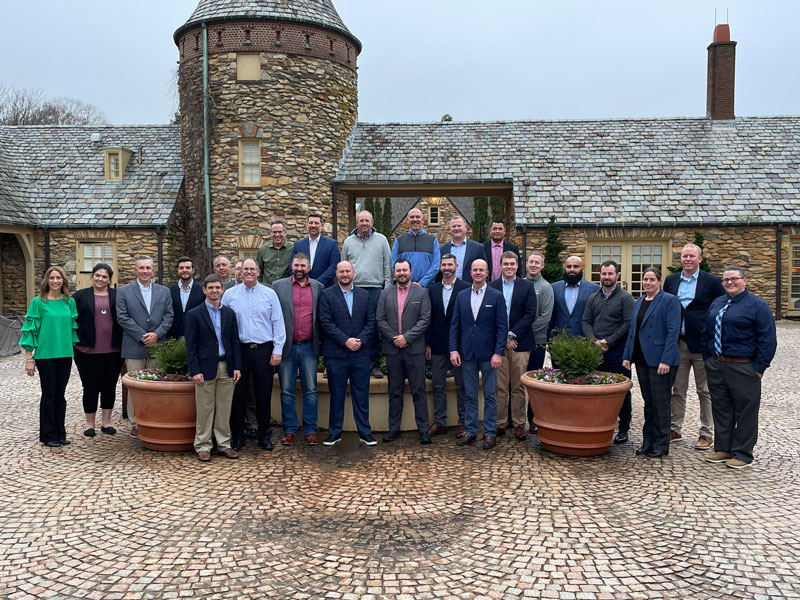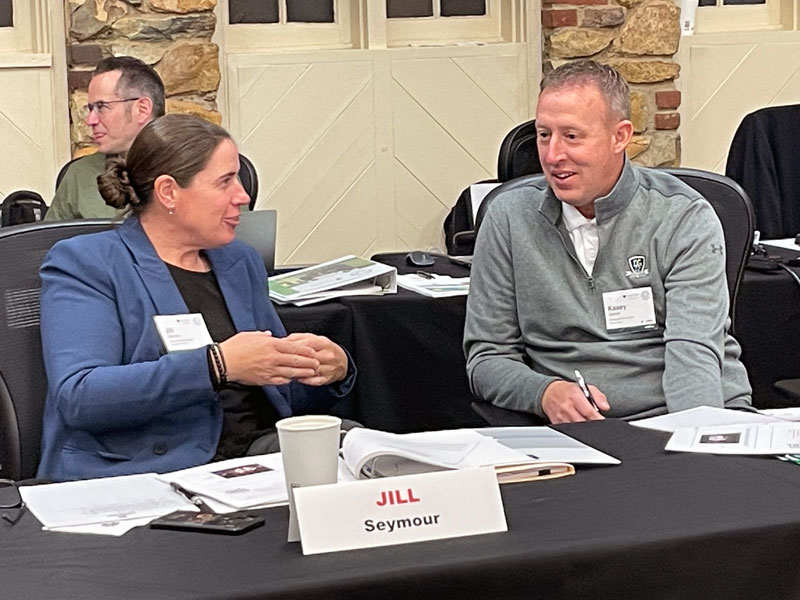
The Syngenta Business Institute class of 2022, posing in the courtyard of the Mews at the Graylyn Conference Center in Winston-Salem, N.C.. Photos by Scott Hollister
Few golf course superintendents get into the business because they love budgeting and financial statements, get a kick out of performance reviews or because they relish the hiring — and sometimes firing — of employees. Yet, every turfgrass
manager will begrudgingly acknowledge just how important those things are to a successful golf operation.
At its core, that was the reasoning behind the creation of the Syngenta Business Institute 14 years ago — to provide superintendents with the kind of high-level, business-focused education that they rarely were offered or explored during their turfgrass education. And throughout the program’s history, superintendents have validated the wisdom that drove its creation through their interest in applying — Syngenta routinely receives nearly 100 applicants every year — and their ultimate attendance — nearly 350 participants have completed the course.
The 2022 edition of the program, that features instructors from Wake Forest University’s renowned School of Business, took place Dec. 6-9 and brought 24 superintendents from around the country to the Graylyn Hotel and Conference Center in Winston-Salem, N.C. And whether through posts on social media, conversations over dinner or in one-on-one chats with industry media, this year’s class confirmed just how vital the knowledge they gained during the week will be to their careers and their golf courses.
“As soon as I get off the plane and get back to my course, I’ll start implementing some of the things I learned right away,” says Jill Seymour, the GCSAA Class A superintendent on the South Course at Charleston Springs Golf Course in Millstone, N.J., and a 13-year association member. “I can see a lot of playing around with different things we learned, trying to see what works for us, what jibes with my crew. But we’ll be diving in 100% when I get back.”
Although members of the class of 2022 came from as far away as the Pacific Northwest to attend, one in particular faced a far shorter commute to the festivities. Matt Jones, CGCS, oversees maintenance at Forsyth Country Club in Winston-Salem, which is located just under 3 miles from Graylyn. The 13-year GCSAA member says the coursework that focused on executive-level decision-making would be his main takeaway from the three-day event.
“It really reaffirmed some of the things I was already doing, but it also gave me some insight into ways I could maybe adjust approaches to get more favorable outcomes,” Jones says. “The negotiating sessions ... gave me some tools to help me get the best outcome for my facility. Whether it’s in a business negotiation for a piece of equipment or some type of contract, I think I’ll have higher confidence that I’ve gotten the best result on behalf of my facility that I could.”

Jill Seymour (left), the superintendent on the South Course at Charleston Springs Golf Course In Millstone, N.J., chats with Kasey Schmitt, the superintendent at Dubuque (Iowa) Golf and Country Club, during an aside at the Syngenta Business Institute.
Those kinds of comments are music to the ears of event-organizers Syngenta, which remain committed to the event and its non-product-focused curriculum largely because of the overwhelmingly positive feedback that it gets from superintendents who have
taken part in the program.
“After our customers leave SBI each year, they continue to express their desire for more education that provides business and leadership development,” says Stephanie Schwenke, Syngenta’s turf market manager. “We understand superintendents are responsible for managing more than agronomics on the golf course. SBI helps customers develop skill sets while working to mentor the next generation.”
SBI 2022 marked a return to in-person activity in Winston-Salem following two years of virtual education brought about by the COVID-19 pandemic. Sessions included topics ranging from financial management and effective negotiations to leading across different cultures and generations to tips on managing individuals and teams.
Scott Hollister is GCM's editor-in-chief.